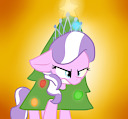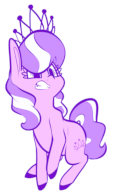
The Wish Jar
A mahogany sideboard hugs the east wall of the parlor. It is big and dark, an imposing piece even in such a spacious room. A richly embroidered silk runner protects its top, upon which rests two cut glass carafes, one half-filled with claret. Centered between them stands a pottery jar. In such an elegant room, with its striped wallpaper and portraits wrapped in gilded frames, the jar looks incongruous. Misshapen and naively painted, the jar is the plainest and least expensive object in the entire Rich household, yet it occupies a place of honor.
A very young pony sits in front of the sideboard, staring at the jar. It is Diamond Tiara. She has sat there for at least forty minutes, and despite strong suggestions from her father to do something else, she has not moved.
Outside snow falls, silently blanketing the ground. Under normal circumstances, Diamond Tiara would sit by the window, gazing wide eyed as the snowflakes tumble down. This year there are no normal circumstances, and she stares at the jar instead.
“Snow on Hearth’s Warming Eve is good luck,” her father says. She ignores him.
On Hearth’s Warming Eve a throng of ponies usually fills the house. Her relatives, along with Father’s friends and business associates, would crowd the parlor with conversation and laughter. Everypony would be happy. Even Diamond Tiara would be happy. She would play with an amusing cousin or two, although she never remembered their names. Or perhaps she would entertain a silly old uncle and coax him out of a few bits. Tonight, on her sixth Hearth’s Warming Eve, the parlor does not overflow with ponies. The house is empty except for Father.
Even the servants are gone. Father sent them home, a rare occurrence for the house’s working staff, even on this holiday. Earlier tonight, she watched them file into the darkness, offering Father profuse but solemn thanks. Now, only she and her father remain in the cavernous parlor, hardly talking. As the night goes on, the room becomes quieter than she thought possible. Only the softly ticking clock and the occasional snap from the fireplace disturbs the stillness.
Last week, in this very room, family and friends and associates packed the parlor to bursting, yet the house remained quiet, as quiet as the world outside muffled beneath the snow. Ponies with vacant faces huddled in hushed conversations. She remembers tears. Some were her’s. Everypony offered condolences to Father, and everypony hugged the little filly who lost her mother.
And then, with all the suddenness and confusion with which her life changed, the house emptied out.
Better to have an empty house tonight, Diamond Tiara thinks. Anyway, the holiday is stupid. Too much off-key singing. Too many old ponies telling repetitive, boring stories. She never liked those parts of the holiday and is grateful she will not have to endure them tonight. It would, she thinks, have been better if the holiday had not come at all.
But the holiday has come, and so only one thing matters to Diamond Tiara, and that is the piece of pottery sitting on the sideboard. It is the wish jar.
The wish jar is a holiday tradition in her family. Her father starts telling the story of the old jar at dinner time weeks before Hearth’s Warming Eve. He has told his story so many times Diamond Tiara finds it annoying, but she knows it by heart.
Years ago, her great-great-grandmother started the tradition. She formed the jar from ropes of clay and painted it herself right before the holiday. Everypony knows that part, but her relatives squabble over who had the idea for the wishes. It seemed they enjoy contradicting one another. Diamond Tiara does not care who made the jar or who thought of the idea as long as the wishes come true.
Tradition dictates that every family member writes their wish on a scrap of paper, folds it, and puts it in the jar. Nopony tells what their wish is, and nopony asks. For your wish to come true you must be the only one to know it. Then, on Hearth’s Warming Eve, the mare of the house empties the jar into a fire, burning the wishes, sending them to the stars. If you do not tell anypony else, the stars will grant your wish.
Diamond Tiara is the mare of the house now, and the responsibility of the wish jar falls on her. When Father told her so, she said no. Emptying the wish jar is too important, a job for a mare, not a filly. A job for a mother, not her. Somepony else must do it. But Father insisted she be the one to burn the wishes and make them come true. And while she knows Father is right, she will not admit it. So she stares at the jar sitting atop the sideboard, as she has done every night in the past week, thinking about what she must do.
Long before Mother got sick, she took the jar from its box and placed it on the sideboard, signaling the beginning of the holiday season. Every day a servant brought Mother the mail, and she opened letters from distant relatives and faraway friends, each containing a folded wish for the jar. Diamond Tiara never saw Mother read a single one. How hard that must have been. If Father made her open the mail next year, she is not certain she could resist reading everypony’s wishes.
She is certain she does not like being responsible for the wishes tonight, but Father says it has to be that way because she is the mare of the house.
For her entire life Diamond Tiara has watched Mother empty the jar and always there was a party. Father would call for a toast, and everypony cheered when Mother poured the wishes into the fire. Nopony will cheer for her tonight, and somehow that seems unfair. Everything is unfair.
Do it for tradition, Father grumbled when she spoke to him after dinner. Otherwise, nopony will get their wish, he added before retreating into silence. Why must he be so unfair. Everypony is unfair.
And yet, she wants the wishes to come true. After all, the jar holds her wish—and Mother’s too.
So Diamond Tiara sits in front of the sideboard, staring with wavering eyes, waiting for her turn to serve tradition. Outside the snow stops, and the night grows velvet black.
In Father’s story, the jar is over ninety years old. Something so old is unimaginably to her, but age and tradition do not make the jar pretty. Ugly and twisted, she thinks. And those terrible colors. Hideous. When she told Father, he frowned.
Nopony cares how it looks, he snapped, and then muttered something she could not understand. And besides, he said, after tonight, the jar will be tucked away in the attic in its box. Nopony will see it until next year.
Hidden or not, the jar is ugly as far as she is concerned.
Diamond Tiara takes her eyes off the jar and looks at her father. He stands by the fireplace, prodding the glowing coals until flames return to the logs. She watches his face. It bears no expression, and while he tries to hide it, she thinks he is tired. Last week, when relatives filled the house, he was strong and assured, the way a father should behave. When everypony shuffled past offering condolences, he accepted them with grace and kept her close to his side. He looked brave and handsome then. She liked that. He should always behave that way.
Now she is convinced it must have been an act. He moves so slow and does not speak, all the time looking weak. She heard him cry the other night. Fathers should never cry. He should not cry.
“All right, darling,” he tells her. “It’s late enough. Bring the jar over.”
“Daddy, it’s too high. I can’t reach it.”
“I’ll get it for you.” Mr. Rich walks over and removes the jar from the sideboard, and together, he and his daughter walk to the fireplace.
The fire burns evenly now, its heat making Diamond Tiara uncomfortable, more uncomfortable than when she sat staring at the jar. A log snaps, spitting out a white spark. It startles her, but misses her leg.
Her father removes the jar’s lid and places it on the mantel next to the clock.
“Now, dear, just empty it into the fire and send everypony’s wishes to the stars.”
Diamond Tiara takes the lidless jar from him and holds it in her hooves. Unsteadily, she moves closer to the fireplace, stopping right at the edge of the iron grate.
“Not too close now,” Father cautions.
She slides back and looks into the jar. She has never seen the inside of the filled jar before. Mother always put in the wishes. The jar is packed with bits of folded paper, all different sizes, all different colors. It looks messy and pretty at the same time. Her wish was written on lavender paper she remembers, and she folded it with sharp creases before presenting it to Mother.
Mother wrote her wish right then—she can’t remember what color paper Mother used—and both slips went in at the same time. Their wishes were some of the first. Now the jar holds so many pieces, ones from aunts and uncles and the cousins whose names she can never remember. She could never find her wish or Mother’s.
Diamond Tiara thinks about the wishes she holds in her hooves. Nopony tells another what they wish for, even after the wishes are no more than ash. It is all a secret, a secret forever. When she was quite young, Mother whispered to her that keeping your wish secret makes the magic work. Diamond Tiara is not good at keeping secrets, but she has never told her wish to anypony. It would break the magic.
But wishes don’t always come true, Diamond Tiara knows now, otherwise she wouldn’t be the one emptying the jar. Tonight, on Hearth’s Warming Eve, when the magic of wishes used to feel so real and strong, she is not sure she believes anymore.
As she stares into the jar, Father sits down in his chair. She sees him now, and he is looking right at her, watching intently.
“Go ahead, Diamond.” Father’s voice sounds shaky.
She glares at him. He’s leaning back, looking relaxed, but she knows he isn’t. He is acting again, pretending everything is normal. She knows it. His face is stiff, a wooden mask with distant glassy eyes.
“How do I do this again?” she asks.
“Just turn it over. They’ll go in by themselves,” he replies and motions to her. “That’s all you have to do.”
She looks into the jar one last time and then tilts it, letting the pieces of folded paper spill over the jar’s lip and into the flames. They ignite, unfolding like flowers blooming, red and yellow, rapidly transitioning to black as the fire consumes them. Flecks of burning paper fly up the chimney, soaring into the night.
“There you go,” her father says.
For a moment, Diamond Tiara believes in magic and wishes again. She believes everypony’s wish can come true. She believes her wish can come true.
A draft races down the chimney, sending smoke puffing from the fireplace. The acrid smoke burns her eyes and nose. Diamond Tiara gasps and rushes to put her hooves over her face. The empty jar slip from her grasp and strikes the grate with a muted crack. Choking, she turns to escape the smoke and stumbles. Her head meets the hard hearth tiles. It stings, and she cries out.
Father springs from his chair and cradles her, saying, “Oh, baby. My baby. Are you all right?”
“I broke it,” she moans. “I heard it. I broke the wish jar. There are no more wishes.”
“No, no, darling.” Mr. Rich checks the jar as he brushes her mane. “A chip, that’s all. Only a piece out of the lip. I’ll have one of the servants fix it.”
Her eyes burn, and she cannot focus through the tears. The room is a watery blur.
“Daddy, the wishes! Did they burn up? Did they make it to the stars?”
Father’s face is a blur too. She cannot see he has tears of his own nor that he wears a pained smile.
“Yes. All of them,” he tells her. “Your wish, my wish, Momma’s wish. They made it to the stars. It’s all right now. Momma will make sure they come true.”
Father’s hug is tight, so tight that she finds it hard to breathe. She does not complain.
All the pieces of paper bearing the wishes did go into the fire that night. Bits of burning ash flew up the chimney, soaring out into the deep black of the winter sky like scintillating orange stars.
All the wishes burned save one.
On the roof of the house, a singed piece of paper unfolds as wet snow seeps into it. Written in a refined cursive, the product of years of practice, the paper holds these words: My daughter needs one true friend.
The snow transforms the words into illegible streaks.
Throughout the winter, the paper remains on the roof, covered by subsequent snowfalls that progressively wash away the writing until it all but vanishes. A faint tinge of blue is all that remains by the time the spring sun dries the paper, and it slides into the gutter, joining the remains of last fall’s leaves. April’s rain washes the paper and decaying leaves to the downspout and out into the garden alongside the house. The paper lays besides a holly bush.
Mr. Rich’s gardener finds the paper one afternoon and curiously checks both sides for an indication of what it contained. He finds nothing and shrugs, throwing it into the pile of leaves he is raking. He doesn’t think of the paper again, for he is not in the habit of thinking too hard about such things. He has work to do.
The old gardener loads the leaves into a bushel basket and takes them out back where he dumps them onto a pile. Once enough leaves and trash have accumulated, they will be burned.
Before summer has truly come, on a clear, cool night, the gardener sits with a few of the other servants by a bonfire made from the leaves and trash. They share a drink or two, tell stories, and laugh. The fire burns for hours while Mr. Rich’s servants enjoy themselves. Nopony thinks of their jobs or the family they work for.
Eventually the flames reach the wordless scrap of paper. The empty wish is consumed, disappearing in a shower of sparks, and enters the night. There it joins the other wishes as they drift amongst the stars, waiting to be answered.
















In hindsight, maybe her wish should have been "I wish my father would never remarry".
This is still a great little story, even if my slowness in editing kept it hidden away for so long.
Thank you for writing this.
A poignant little piece.
Also, there's a tag for Filthy Rich now.
8736272
Thank you on both counts.
8736461
No problem! Thanks for the story!